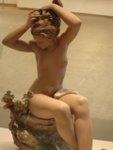*text below is 100% copied from the book I'm reading*
The Wei shu tells us that two thousand years ago, at the time of Emperor Yao, Tan'gun Wanggom chose Asadal as his capital and founded the state of Choson. The Old Record notes that in olden times Hwanin's son, Hwanung, wished to descend from Heaven and live in the world of human beings. Knowing his son's desire, Hwanin surveyed the three highest mountains and found Mount T'aebaek the most suitable place for his to settle and help human beings. Therefore he gave Hwanung three heavenly seals and dispatched him to rule over the people. Hwanung descended with three thousand followers to a spot under a tree by the Holy Altar atop Mount T'aebaek, and he called this place the City of God. He was the Heavenly King Hwanung. Leading the Earl or Wind, the Master of Rain, and the Master of Clouds, he took charge of some three hundred and sixty areas of responsibility, including agriculture, allotted life spans, illness, punishment, and good and evil, and brought culture to his people.
At that time a bear and a tiger living in the same cave prayed to Holy Hwanung to transform them into human beings. He gave them a bundle of sacred mugworts and twenty cloves of garlic and said, "If you eat these and shun the sunlight for one hundred days, you will assume human form." Both animals ate the species and avoided the sun. After twenty-one days the bear became a woman but the tiger, unable to observe the taboo, remained a tiger. Unable to find a husband, the bear-woman prayed under the altar tree for a child. Hwanung metamorphosed himself, lay with her, and begot a son called Tan'gun Wanggom.
Tan'gun later was often considered the first Korean and/or founder of the first Korean state. This account goes on to say that in the "fiftieth year of the reign of Emperor Yao," on a date calculated as October 3rd, 2333 B.C.E., Tan'gun was said to have established the stated of Choson. This date has become a national holiday in South Korea. Koreans today often refer to the "five thousand years of Korean history," a phrase based on this legendary date.
Reading is like decoding a secret!
I guess this is where I find my rare pleasures in reading.













No comments:
Post a Comment